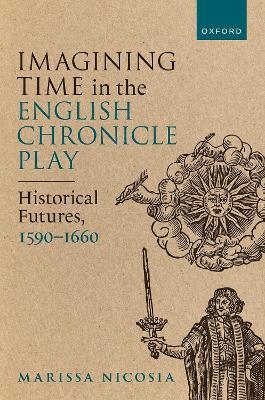
Imagining Time in the English Chronicle Play
Historical Futures, 1590-1660
Seiten
2023
Oxford University Press (Verlag)
978-0-19-887265-8 (ISBN)
Oxford University Press (Verlag)
978-0-19-887265-8 (ISBN)
This volume argues that early modern chronicle plays reckon with past, present, and future time, and in doing so they construct speculative and imagined futures on the stage and in print. It examines the formal and material ways that playwrights imagined futures in dramatic works that were purportedly about the past.
Imagining Time in the English Chronicle Play: Historical Futures, 1590-1660 argues that dramatic narratives about monarchy and succession codified speculative futures in the early modern English cultural imaginary. This book considers chronicle plays--plays written for the public stage and play pamphlets composed when the playhouses were closed during the civil wars--in order to examine the formal and material ways that playwrights imagined futures in dramatic works that were purportedly about the past.
Through close readings of William Shakespeare's 1&2 Henry IV, Richard III, Shakespeare's and John Fletcher's All is True, Samuel Rowley's When You See Me, You Know Me, John Ford's Perkin Warbeck, and the anonymous play pamphlets The Leveller's Levelled, 1 & 2 Craftie Cromwell, Charles I, and Cromwell's Conspiracy, the volume shows that imaginative treatments of history in plays that are usually associated with the past also had purchase on the future. While plays about the nation's past retell history, these plays are not restricted by their subject matter to merely document what happened: Playwrights projected possible futures in their accounts of verifiable historical events.
Imagining Time in the English Chronicle Play: Historical Futures, 1590-1660 argues that dramatic narratives about monarchy and succession codified speculative futures in the early modern English cultural imaginary. This book considers chronicle plays--plays written for the public stage and play pamphlets composed when the playhouses were closed during the civil wars--in order to examine the formal and material ways that playwrights imagined futures in dramatic works that were purportedly about the past.
Through close readings of William Shakespeare's 1&2 Henry IV, Richard III, Shakespeare's and John Fletcher's All is True, Samuel Rowley's When You See Me, You Know Me, John Ford's Perkin Warbeck, and the anonymous play pamphlets The Leveller's Levelled, 1 & 2 Craftie Cromwell, Charles I, and Cromwell's Conspiracy, the volume shows that imaginative treatments of history in plays that are usually associated with the past also had purchase on the future. While plays about the nation's past retell history, these plays are not restricted by their subject matter to merely document what happened: Playwrights projected possible futures in their accounts of verifiable historical events.
Marissa Nicosia is an Associate Professor of Renaissance Literature at the Pennsylvania State University - Abington College where she teaches, researches, and writes about literature, temporality, food history, and material texts. She is co-editor of Renaissance Futures, a special volume of Explorations in Renaissance Culture (2019), and Making Milton: Print, Authorship, Afterlives (Oxford University Press, 2021).
| Erscheinungsdatum | 28.09.2023 |
|---|---|
| Zusatzinfo | 16 Illustrations |
| Verlagsort | Oxford |
| Sprache | englisch |
| Maße | 165 x 241 mm |
| Gewicht | 494 g |
| Themenwelt | Geisteswissenschaften ► Sprach- / Literaturwissenschaft ► Anglistik / Amerikanistik |
| Geisteswissenschaften ► Sprach- / Literaturwissenschaft ► Literaturgeschichte | |
| Geisteswissenschaften ► Sprach- / Literaturwissenschaft ► Literaturwissenschaft | |
| ISBN-10 | 0-19-887265-8 / 0198872658 |
| ISBN-13 | 978-0-19-887265-8 / 9780198872658 |
| Zustand | Neuware |
| Haben Sie eine Frage zum Produkt? |
Mehr entdecken
aus dem Bereich
aus dem Bereich
Poetik eines sozialen Urteils
Buch | Hardcover (2023)
De Gruyter (Verlag)
59,95 €
Buch | Softcover (2024)
belleville (Verlag)
20,00 €


